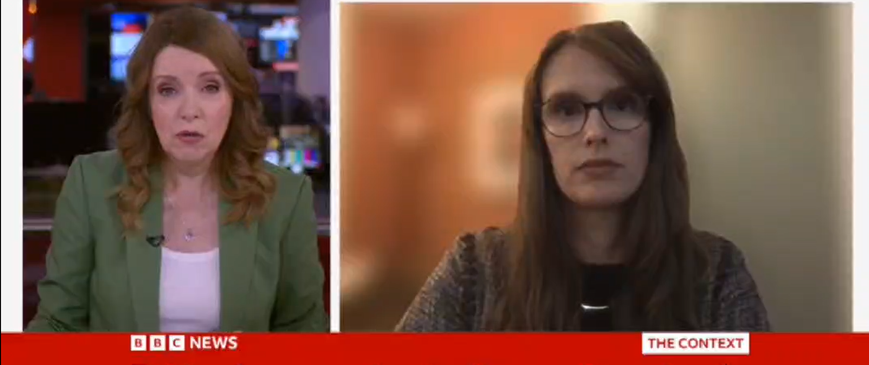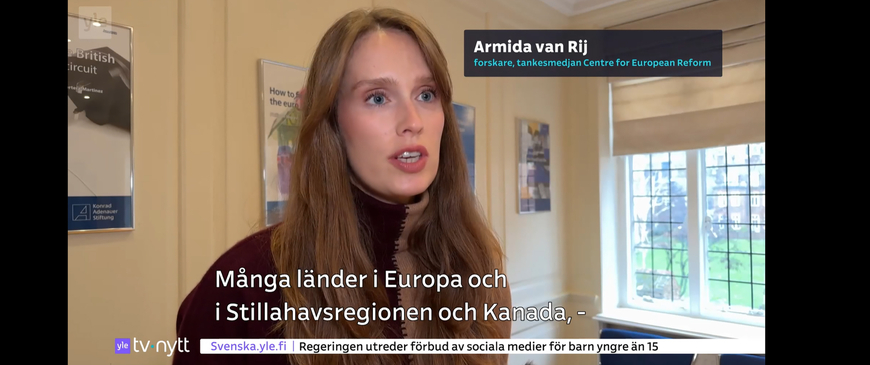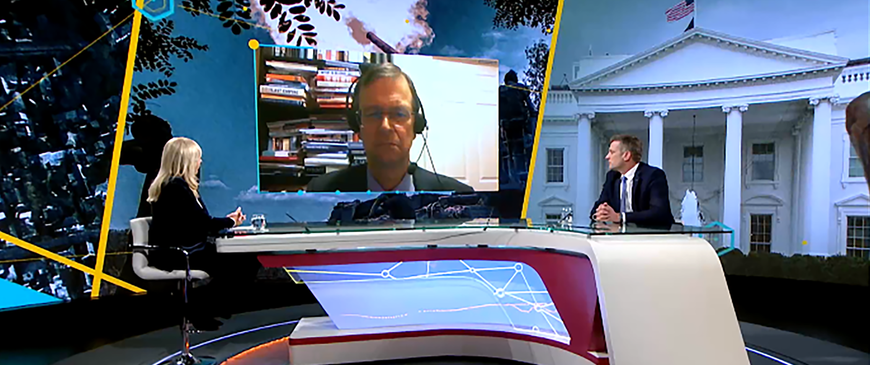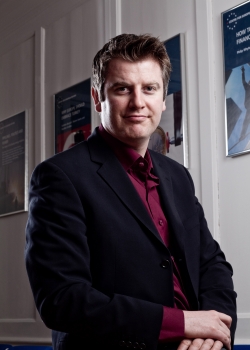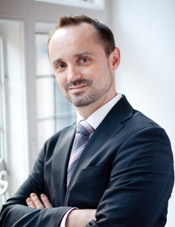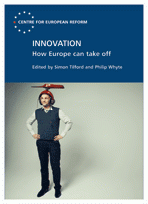Press
Video debate: A new global recession?
22 September 2011
Financial Times
Is the world heading back into recession? The world's top policymakers will talk of little else when they gather in Washington for the annual IMF meetings. Analysis editor Frederick Studemann debates these issues with Simon Tilford, chief economist at the CER, John Authers and Ralph Atkins.
European banks' exposure to Greek debt erodes market confidence
20 September 2011
Voice of America
"They don't know which banks are sitting on which debt, so they are becoming increasingly loathe to loan to European banks," said Simon Tilford, chief economist at the London-based Centre for European Reform.
It's make up or break up time for the eurozone
20 September 2011
Time
But these assertions sit uneasily with the events of the past two years, according to Simon Tilford, chief economist at the London-based think-tank the Centre for European Reform, who warns that a fracturing of the eurozone is almost inevitable
Nuclear bans build case for EU energy co-operation
19 September 2011
Reuters
"The Germans quickly and unilaterally decided. They did not consult with their European neighbours and now after the event we're scrambling to cope with the consequences," said Katinka Barysch, deputy director of the Centre for European Reform in London.
Who to blame for crisis of leadership
18 September 2011
Irish Independent
"Merkel, together with the German economic establishment, is responsible for the European debt crisis deepening to the point where the euro could fall apart," said Simon Tilford, chief economist with the London-based think-tank, the Centre for European Reform.
Acropalypse now for the euro
18 September 2011
The Sunday Times
Simon Tilford, chief economist at the London-based Centre for European Reform, argues that Britain could escape relatively lightly if it is only Greece and Portugal which leave the single currency. Their economies are small enough for the disruption to be manageable.
EU finance ministers delay aid decision
16 September 2011
Voice of America
Beyond quick action, Simon Tilford, chief economist for the London-based Centre for European Reform, says European governments need to fundamentally change the way they handle the crisis. "Despite mounting evidence that the current strategy is not working, instead of reassessing the strategy, eurozone policy-makers are essentially digging their feet in and just persisting with a strategy that isn't working. And that is very worrisome," Tilford said.
European debt crisis: leaders ponder fiscal union
15 September 2011
The Guardian
"This may not be politically feasible," says Charles Grant, director of the Centre for European Reform think-tank. "A fiscal union and eurobonds could help, but it will mean the southern countries giving up economic sovereignty. Berlin could destroy the euro if it goes on like this. "Its over-zealous discipline and austerity medicine is not going to work. Besides all this economic government stuff is irrelevant to the euro crisis. It's now a crisis of growth, of banking, with liquidity drying up.
Analysis - Austerity pressure grows on Irish coalition
15 September 2011
Reuters
"If they are trimming fat off the state, there won't be huge political ramifications, in fact they might get credit for that," said Hugo Brady, senior research fellow at the Centre for European Reform. "But if they cut what is seen as the family silver, or fire sale state assets for less than they are worth, this will make Labour's position more difficult. … If there is a flurry of defaults, all bets are off," said Brady.
The crisis in a nutshell: "A dangerous new phase" for Europe
15 September 2011
The New Yorker
"Greece can always choose to leave. As long as all this is between freely consenting adults, it's not that undemocratic." Charles Grant, director of the Centre for European Reform.
Britain balks at EU defence plan
13 September 2011
The New York Times
"There is a semi-detachment which even some senior British diplomats are concerned about," said Charles Grant, director of the Centre for European Reform. "The DNA of the old-school British diplomat said that you have to be in the room when the decision is taken to shape the debate. But the Tory leadership doesn't seem to worry about that.
EU plans to exclude wayward Schengen nations
12 September 2011
Financial Times
"Any move to exclude countries would clearly be targeting Greece, among others, which has been a problem for Schengen ever since it joined in 2000," says Hugo Brady, fellow at the Centre for European Reform, a London-based think-tank.
Western alliance: European cutbacks raise US concerns
12 September 2011
Financial Times
Instead, as Tomas Valasek of the Centre for European Reform has argued, Europe will see the emergence of what he calls "islands of co-operation".
Europe nosedives as central banker quits and Greece looks set to spin out of control
10 September 2011
International Herald Tribune
Charles Grant, the director of the think-tank Centre for European Reform, said: "In opposing the bond purchase scheme they are basically saying the euro should not survive in its current form. The only reason the ECB is buying these bonds is to prop up the current system." Mr Grant argued that if Mr Stark's departure led to a more united ECB then it would be good news. "I hope Mr Weidmann learns to be a team player, which Weber and Stark weren't," he said.
Russian plane crash clouds Putin's goals
09 September 2011
Bloomberg
Still, the accidents may generate sympathy for Russia and its leaders, Tomas Valasek, director of foreign policy and defence at the London-based Centre for European Reform, said in a telephone interview yesterday. While regional airlines may be "decrepit," the flagship carrier OAO Aeroflot has one of Europe’s newest fleets, he said. "I don’t know how you draw generalisations for Russia from this incident," Valasek said. "It appears to have been a pilot error and it says nothing about the safety of the airport."
Europe is urged to take bolder action on debt
09 September 2011
The New York Times
Simon Tilford, the chief economist of the Centre for European Reform in London, is among those who say Europe should not be looking to the United States or China or Japan for much additional help — at least for now. "What we'll see in coming months is the Americans and Asians will become more open in their expression of concern about way the Europeans are handling the crisis, because unless they do address key problems, including the banks, there is a risk this is going to trigger a Lehman 2 … They recognise Europe's strategy is not working, and they are starting to panic."
Migration: To open the borders or not?
08 September 2011
European Voice
Hugo Brady, who follows EU migration policy for the CER, a London-based think-tank, does not believe that calls for a more rational debate are necessarily realistic. "It might be intellectually coherent to say that we need 50 million immigrants to keep Europe's economic growth going over the next decades," he says. "But Europe does not have the social and political capacity to deal with massive immigration."
Book review - Innovation in Europe lacks 'creative destruction': CER report states
08 September 2011
EurActiv
European innovation policies lack the "creative destruction" widely accepted in the US, raising barriers for businesses seeking to find new ideas and applications, according to a report compiled by the Centre for European Reform, a British think-tank.
In the report, entitled 'Innovation: How Europe can take off',
...
In the report, entitled 'Innovation: How Europe can take off',
...
Europe steers into a zone of uncertainty
08 September 2011
The New York Times
Inaction to fix the banking sector also troubles markets, said Simon Tilford, an economist with the Centre for European Reform in London, because it "highlights a willful refusal to recognise the core of the crisis, which is the collapse of economic activity and low economic growth." Without growth, he said, there is no easy way forward; growth cannot be produced by austerity or by structural reforms, even if those may help later.
German court rejects challenges to euro bailouts
07 September 2011
The New York Times
"The court ruling removes a substantive obstacle, but there’s no doubt that the situation still looks pretty grave," said Simon Tilford, chief economist at the Centre for European Reform in London. The underlying problems of heavily indebted states and weak, undercapitalised banks still have to be addressed to find a long-term solution, Mr. Tilford said.

